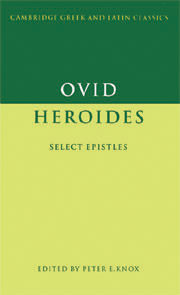Introduction
Published online by Cambridge University Press: 12 October 2018
Summary
THE POET
In antiquity literary criticism could be written by compiling a string of names. Thus Quintilian on the subject of Latin elegy: elegia quoque Graecos prouocamus, cuius mihi tersus atque elegans maxime uidetur auctor Tibullus. sunt qui Propertium malint. Ouidius utroque lasciuior, sicut durior Gallus (10.1.93). Late in Ovid's career, when he defines his own place in Roman literary history by referring to his most important contemporaries, we find that he draws up much the same list:
Vergilium uidi tantum, nee auara Tibullo tempus amicitiae fata dedere meae.
successor fuit hie tibi, Galle, Propertius illi; quartus ab his serie temporis ipse fui. ﹛Trist. 4.10.51-4)
The selection is not random. He places himself in the same Company at Trist. 2.445-66, where he discusses the works of Gallus, Tibullus, and Propertius, concluding (467), his ego successi. The literary climate in Rome during the decade following Octavian's victory at Actium was electric. The scene was dominated by the names O. recalls in Trist. 4.10: Virgil, who released his Georgics in 29 BG, was at work on an epic of Rome's foundation; Horace, the author of two books of satires and a collection of epodes, was nearing completion of the Ödes;1 but most importantly for O.'s own career, Tibullus and Propertius were producing books of amatory elegy appealing to the increasingly sophisticated tastes of the literate elite. They followed the example of their predecessor in the genre Cornelius Gallus, whose poetry was much admired by his contemporaries and must certainly have made a great impression on the young O., though it has not survived in sufficient quantity to allow us a sure assessment.2 Succeeding generations may have looked back at this roster in despair of emulating their achievements; but in 25 BG, when as a young man O. gave up his professional ambitions for a life of literature,3 it may well have seemed the most obvious choice to make.
O. teils more about himself than we are accustomed to hear from ancient poets, both in the long autobiographical poem composed towards the end of his life during his exile on the Black Sea ﹛Trist. 4.10) and in numerous revealing remarks scattered throughout his works.
- Type
- Chapter
- Information
- Ovid: Heroides , pp. 1 - 38Publisher: Cambridge University PressPrint publication year: 1996



